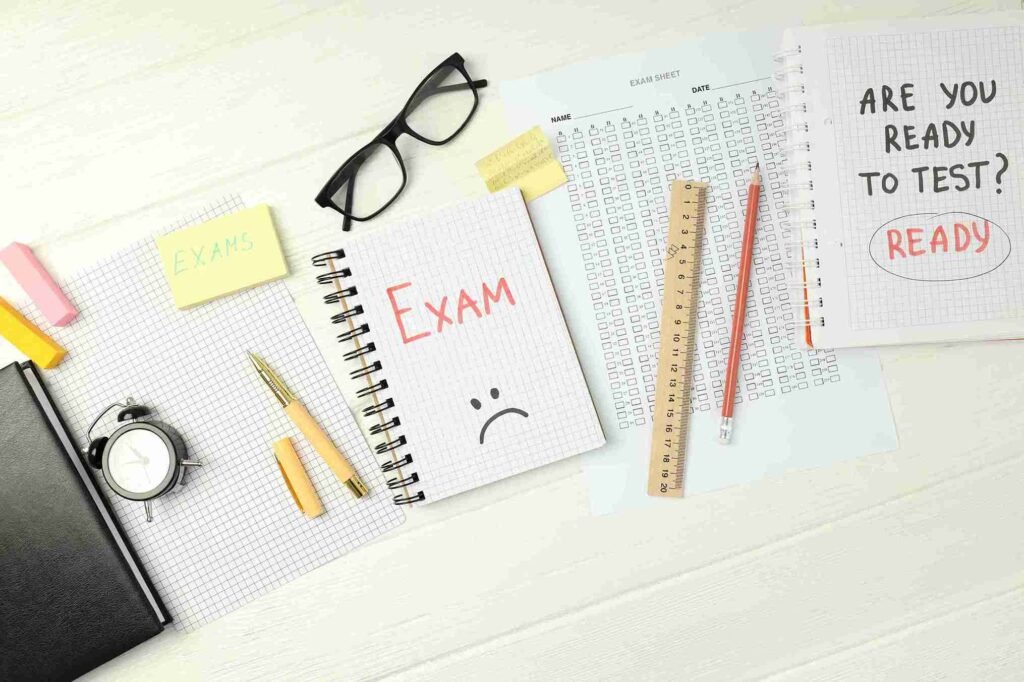
Reducing stress and anxiety can be challenging during exams for students as they face heightened academic pressure and the need to perform well. During this critical period, stress and anxiety can take a toll on students’ mental health and overall well-being, affecting their academic performance and life outside of studies. Therefore, students must equip themselves with effective strategies to manage stress and maintain their mental health during exam periods.
This article explores a comprehensive set of strategies that students can adopt to cope with the demands of exams while nurturing their well-being. By implementing these strategies, students can navigate exam periods with resilience, optimize their study efforts, and strike a healthy balance between academic achievement and self-care.
10 Tips to reduce stress during exams

Time management and planning are essential strategies for students to effectively cope with the demands of exam periods and reduce stress. By implementing efficient time management techniques and creating a well-structured study plan, students can optimize their study efforts and make the most of their available time. Some key aspects of time management and planning include:
1. Creating a Study Schedule:
A well-structured study schedule can alleviate stress during exams by providing a clear roadmap of what needs to be done and when. Knowing exactly when and how long to study each subject can reduce uncertainty and feelings of being overwhelmed.
Break down your study schedule into manageable chunks, ensuring you allocate sufficient time for each subject while also allowing for breaks and relaxation periods. This prevents last-minute cramming and promotes a sense of control over your workload.
2. Setting Realistic Goals:
Setting realistic goals for each study session helps to manage stress by making tasks feel more achievable. Accomplishing these smaller goals provides a sense of progress and accomplishment, reducing anxiety about the overall workload.
Prioritize tasks based on urgency and importance, focusing on what needs immediate attention while also setting aside time for long-term preparation. Breaking down larger goals into smaller, actionable steps can make studying feel more manageable and less daunting.
3. Prioritizing Tasks:
By identifying and prioritizing high-priority subjects or areas, students can allocate their time and energy effectively, reducing stress caused by feeling overwhelmed by the entire syllabus.
Assess which subjects or topics are causing the most stress and allocate extra study time to those areas. This proactive approach can help alleviate anxiety about challenging material and increase confidence in tackling difficult concepts.
4. Utilizing Time Blocks:
Implementing time blocks for studying helps to create a sense of structure and focus, reducing stress caused by feeling lost or unsure about how to manage study time effectively.
Break your study sessions into manageable time blocks, focusing on one task or subject at a time. This approach minimizes distractions and prevents the feeling of being overwhelmed by a large workload, leading to increased productivity and reduced stress.
5. Incorporating Breaks:
Taking regular breaks during study sessions is crucial for reducing stress and preventing burnout. Breaks allow students to recharge mentally and physically, improving overall concentration and productivity.
Schedule short breaks between study sessions to rest, relax, and recharge. Use this time to engage in stress-relieving activities such as stretching, deep breathing exercises, or taking a short walk outdoors.
6. Using Time Management Tools:
Utilizing time management tools such as planners, apps, or digital calendars can help students organize their study schedules and stay on track, reducing stress caused by feeling overwhelmed or disorganized.
Experiment with different time management tools to find the one that best suits your needs and preferences. These tools can help you stay organized, set reminders, and track your progress, reducing stress and anxiety during exam periods.
7. Flexibility and Adaptability:
Being flexible in your study schedule allows for adjustments to be made in response to unexpected events or changes in priorities, reducing stress caused by rigid, inflexible study plans.
Practice mindfulness and acceptance of unexpected challenges or disruptions to your study routine. Maintain a positive attitude and focus on finding solutions rather than dwelling on setbacks, reducing stress, and promoting resilience during exams.
8. Create a Distraction-Free Environment:
Establishing a distraction-free study environment minimizes external stimuli that can contribute to stress and anxiety during exams, allowing for greater focus and concentration.
Choose a quiet, comfortable study space free from distractions such as noise, clutter, or interruptions. Use tools such as noise-canceling headphones or website blockers to minimize distractions and create an optimal study environment.
9. Practice Mindfulness and Stress Reduction Techniques:
Incorporating mindfulness practices and stress reduction techniques into your daily routine can help alleviate exam-related anxiety and promote a sense of calm and relaxation.
Take regular breaks to practice deep breathing exercises, meditation, or progressive muscle relaxation techniques. These techniques can help reduce tension, improve focus, and enhance overall well-being during exam periods.
10. Take Care of Your Physical and Mental Well-Being:
Prioritizing self-care activities such as sleep, nutrition, exercise, and relaxation helps to reduce stress and promote overall well-being during exam periods.
Make time for activities that promote physical and mental health, such as regular exercise, healthy eating, sufficient sleep, and relaxation techniques. Taking care of your well-being is essential for managing stress and performing well academically during exams.
Stress management during exams

Maintaining healthy lifestyle habits is a crucial aspect of managing stress and promoting overall well-being during exam periods. A student’s physical and mental health significantly impacts their ability to cope with academic pressures and perform at their best. By adopting healthy lifestyle habits, students can enhance their resilience and boost their academic performance. Some key healthy lifestyle habits include:
1. Balanced Diet
Consuming a balanced diet that includes a variety of nutrients, vitamins, and minerals is essential for optimal brain function and energy levels. Eating regular, nutritious meals helps sustain concentration and mental clarity during study sessions.
2. Hydration
Staying well-hydrated is vital for cognitive function and maintaining energy levels. Drinking an adequate amount of water throughout the day can prevent dehydration and improve overall alertness.
3. Regular Exercise
Engaging in regular physical activity, such as walking, jogging, or yoga, not only improves physical health but also helps reduce stress and enhances mood through the release of endorphins.
4. Sufficient Sleep
Getting enough restful sleep is critical for memory consolidation, learning, and overall mental health. Students should aim for 7-9 hours of sleep per night to ensure proper cognitive functioning and emotional well-being.
5. Mindfulness and Relaxation Techniques
Practicing mindfulness meditation, deep breathing exercises, or yoga can help reduce stress and promote a sense of calmness and focus.
6. Limiting Caffeine and Sugar
While a moderate amount of caffeine may aid alertness, excessive consumption can lead to jitteriness and disrupt sleep patterns. Similarly, limiting sugary snacks can prevent energy crashes and maintain stable blood sugar levels.
7. Avoiding Excessive Screen Time
Taking breaks from electronic devices and screens can reduce eye strain and improve sleep quality. It also allows time for relaxation and social interactions.
8. Social Connections
Maintaining social connections with friends and family provides emotional support and an opportunity to share feelings and experiences, helping reduce feelings of isolation or stress.
9. Time Outdoors
Spending time in nature or taking short walks outdoors can improve mood and mental clarity, reducing feelings of tension and anxiety.
10. Practicing Self-Compassion
Being kind to oneself and acknowledging that occasional setbacks are normal can alleviate self-imposed pressure and boost self-confidence.
How to avoid stress while studying?

To avoid stress while studying, it’s essential to establish effective strategies that promote a balanced approach to learning. Planning ahead with a realistic study schedule helps in breaking down the workload into manageable tasks, preventing the pressure of last-minute cramming.
1. Stress-Reduction Techniques
Stress-reduction techniques are invaluable tools for students to manage exam-related stress and promote overall well-being. Implementing these techniques helps students cope with anxiety, maintain focus, and achieve a calmer state of mind during the exam preparation period. Deep breathing exercises, mindfulness meditation, and progressive muscle relaxation are effective stress-reduction methods that can be practiced anywhere, providing instant relief from tension and promoting relaxation.
Taking short breaks during study sessions to engage in these techniques allows students to recharge their minds, enhance concentration, and approach their studies with a clearer and more composed mindset. By integrating stress-reduction techniques into their daily routine, students can build resilience and improve their ability to handle academic challenges with greater ease and confidence.
2. Social Support and Communication
Social support and communication play a vital role in helping students navigate the stress of exam periods. Talking to friends, family members, or classmates about feelings and concerns can provide emotional validation and reassurance, reducing feelings of isolation. Forming study groups with peers allows students to collaborate, share knowledge, and provide mutual support during the exam preparation process.
Seeking guidance from teachers or school counselors for academic and emotional support can also be beneficial, as they can offer valuable advice and strategies for coping with stress. By fostering positive social connections and open communication channels, students can feel more supported, encouraged, and motivated throughout their exam journey, enhancing their overall well-being and academic success.
3. Avoiding Procrastination and Time Wasters
Avoiding procrastination and time wasters is crucial for students to make the most of their study time during exam periods. Procrastination, such as putting off important tasks or succumbing to distractions, can lead to increased stress, reduced productivity, and missed study opportunities. By recognizing procrastination triggers and implementing strategies to overcome them, students can stay focused and disciplined in their study routine.
Minimizing time wasters, such as excessive social media use or unrelated activities, allows students to dedicate more time to productive studying. Setting specific study goals, using time management techniques, and creating a conducive study environment can all help students break the cycle of procrastination and optimize their study sessions. By cultivating self-discipline and prioritizing academic responsibilities, students can effectively manage their time, reduce stress, and approach exams with greater confidence and preparedness.
4. Positive Self-Talk and Mindset
Positive self-talk and mindset are powerful tools that can significantly impact a student’s exam preparation and overall well-being. Engaging in constructive and encouraging inner dialogue can boost self-confidence, motivation, and resilience in the face of challenges. By acknowledging achievements, setting realistic goals, and reframing negative thoughts into positive affirmations, students can cultivate a growth mindset.
Embracing a growth mindset involves understanding that abilities can be developed through effort and learning from setbacks, rather than viewing failures as permanent shortcomings. Positive self-talk can counter self-doubt and reduce exam-related anxiety, creating a positive mental environment for effective studying. By nurturing a supportive and optimistic inner dialogue, students can harness their full potential, maintain focus during exam periods, and approach tests with a confident and determined outlook.
5. Seeking Professional Help if Needed
Seeking professional help when needed is a crucial step in ensuring students’ mental well-being and academic success during exam periods. While stress is a normal part of academic life, excessive stress or persistent feelings of anxiety may require additional support. Students who find themselves struggling to cope with exam-related stress or experiencing overwhelming emotions can benefit from reaching out to counselors, therapists, or mental health professionals.
These professionals can provide valuable guidance, coping strategies, and a safe space for students to express their feelings and concerns. Schools and universities often offer mental health services, and seeking help from these resources can contribute to improved emotional resilience and a more positive exam preparation experience. By prioritizing mental health and recognizing the value of seeking professional support, students can gain the necessary tools to manage stress effectively and achieve their academic goals with confidence.
6. Balancing Academic and Personal Life
Balancing academic and personal life is essential for students to maintain their well-being, reduce stress, and achieve overall success during exam periods. While academic commitments are crucial, neglecting personal interests and social connections can lead to burnout and hinder academic performance. Setting boundaries and time management are key to striking a balance between study hours and leisure activities.
Allocating specific time for personal hobbies, exercise, and social interactions allows students to recharge their minds and foster a healthy work-life harmony. Prioritizing self-care and maintaining a support network of friends and family provide emotional support and contribute to a positive mindset. By embracing a balanced approach to academics and personal life, students can approach exams with a refreshed perspective, improved focus, and a greater sense of fulfillment in all aspects of their lives.
Conclusion:
The journey through exam periods is a transformative time in every student’s life, presenting opportunities for growth and learning. However, it also brings forth unique challenges that can impact students’ mental health and academic success. Recognizing the significance of maintaining a healthy mindset and managing stress, students can benefit from a repertoire of effective strategies to navigate this crucial phase with confidence and composure.
By prioritizing time management, adopting healthy lifestyle habits, and seeking social support, students can foster a conducive environment for effective studying and personal well-being. Ultimately, by embracing a holistic approach to exam preparation, students can emerge not only as successful achievers academically but also as resilient individuals who have cultivated lifelong skills to manage stress and maintain their mental health in various aspects of life.